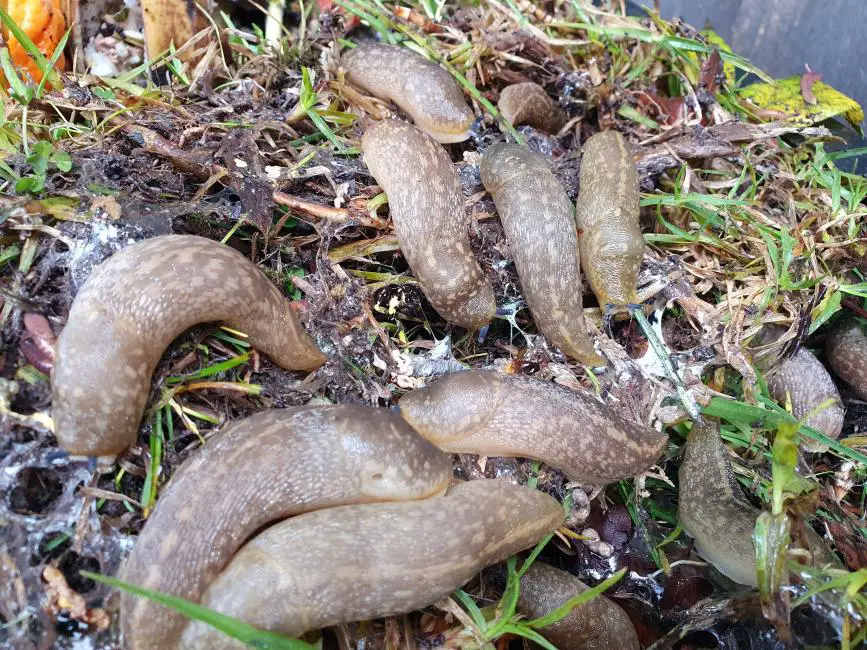If you’re a keen gardener, you undoubtedly know that slugs are the enemy of your garden. But what about when you spot them in your compost pile?
In this article I go into detail on everything you need to know about having slugs in your compost (there’s no need to panic – they can be beneficial).
Here’s the short version.
Are slugs bad for compost? Having slugs in your compost is nothing to worry about. The slugs aid the composting process by eating the decaying matter. As the compost provides a constant source of food, the slugs are unlikely to leave the bin. Any slug eggs will be eaten by other critters (e.g. beetles) in the compost.
Slugs in compost: good or bad?
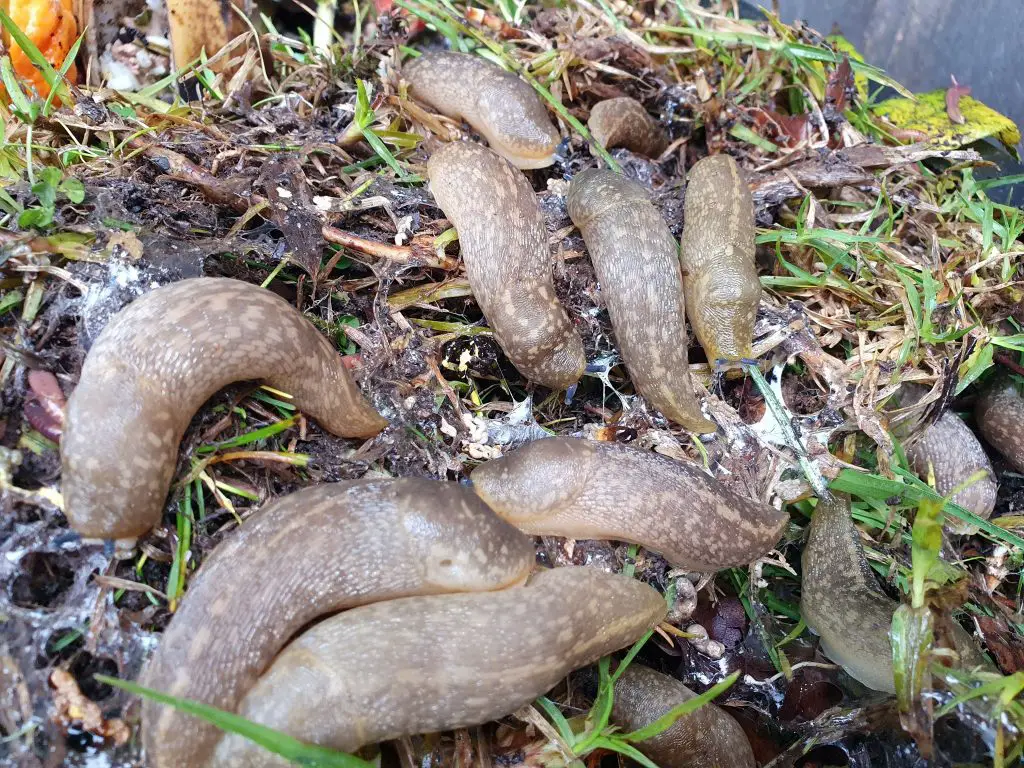
Compost bins provide the perfect habitat for slugs.
Dark, damp, and full of food.
Slugs are famous for eating live plants, but they also enjoy decaying matter. Some slug species don’t actually have strong enough mouths to eat fresh plants, so need to wait until they’re softer (i.e rotting) to eat them.
It’s no surprise they end up in your compost bin.
Luckily, slugs pose no risk to your compost.
In fact, they’re helping to speed up the composting process by eating the decaying matter. Think of them like worms. Some people even move slugs from their garden into their compost bin.
Won’t the compost slugs leave the bin and ruin all my plants?
It’s natural to worry about the slugs migrating from the compost bin to your veg patch, but once a slug has found the compost bin it’s highly unlikely to leave.
There’s an abundance of food available, it never dries out, and the slugs have protection from predators.
Why would they leave?
Clever slugs won’t venture too far from the cushy life they lead in your compost bin.
What about all the baby slugs?
Another big worry is that the compost slugs will lay eggs, and then you’ll spread these eggs around your yard when you use the compost.
*cue attack of the baby slugs*
This is an understandable concern, but not one you should worry about.
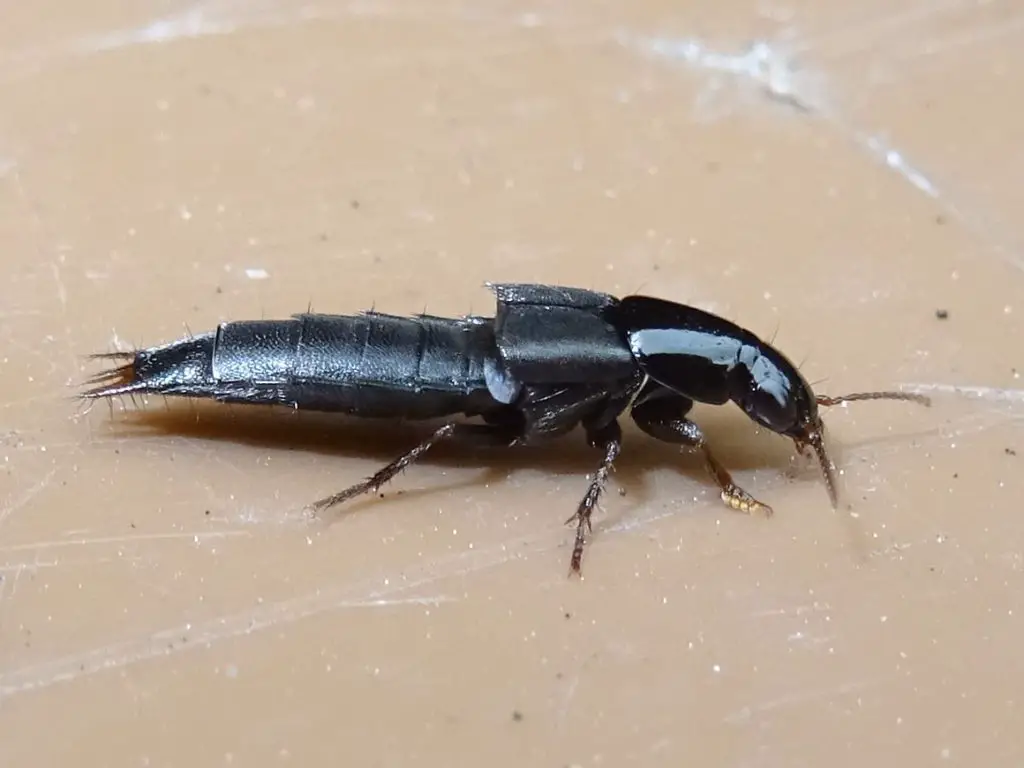
The eggs will most likely be eaten by predators in the bin such as beetles. Or, if they manage to evade the beetles, the eggs will be squashed by the weight of the compost above and turn into compost themselves.
Also, you should only find the slugs in the top half of your bin.
In the later stages of composting, there’s no food for the slugs and the compost tends to be dryer. This means that the bottom of the bin (where the finished compost is) isn’t a suitable home for slugs. Hence why you won’t find any eggs there.
Are slugs in compost ever an issue?
If your compost is overrun with slugs, it could be an indication that your compost is too wet. Slugs love moisture, so the wetter your compost is, the more slugs you’ll find.
Take out a handful of compost from the middle of your pile and squeeze it. One or two drops of water should come out, but no more.
If you’re able to squeeze a lot of water out, add some extra brown materials into the bin like paper, cardboard, or dried leaves. Then turn the compost. The dry materials will help soak up the excess moisture and turning the compost will help aerate it.
A note on the leopard slug
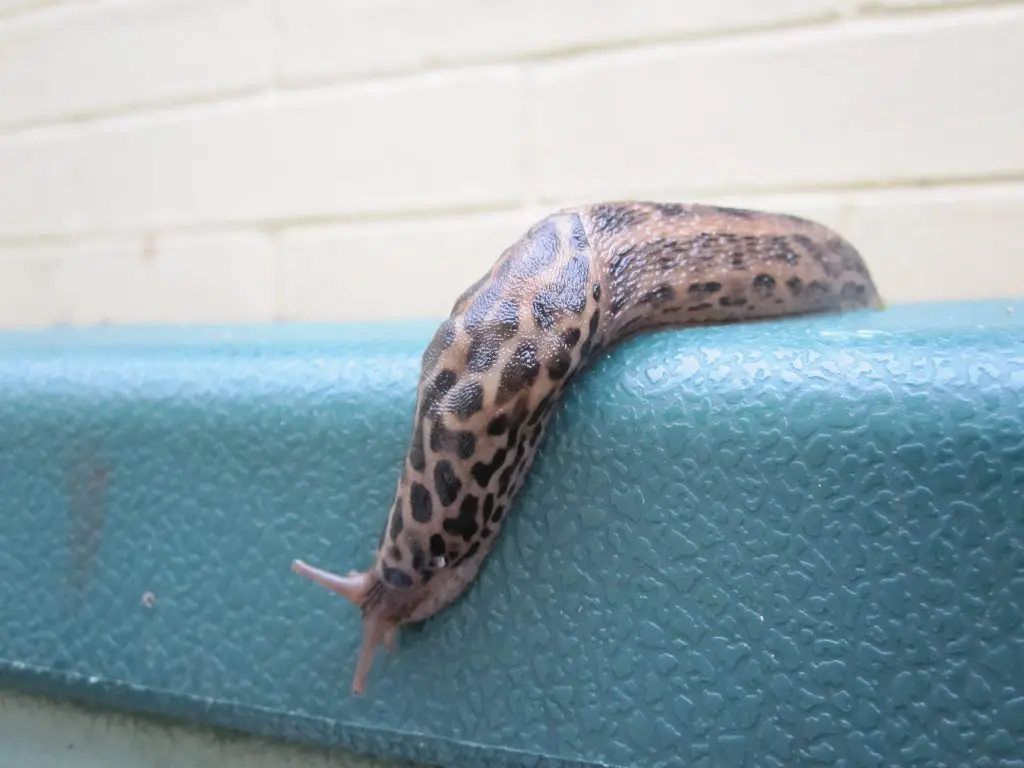
There’s one type of slug that you definitely never need to worry about in your compost and that’s the leopard slug.
Named for its spotty/stripy pattern, this is a carnivorous slug. It chows down on the veg-eating slugs in your compost pile, helping eliminate them with no work from you.
If you see one of these slugs in your yard, leave it be! It will be an ally in your fight against slugs.
How to get rid of slugs in compost
Never use slug pellets to get rid of slugs in your compost bin. The chemicals can also kill the essential composting microbes. The easiest way to get rid of slugs is to go out every night and pick them out by hand. You can also try introducing slug predators into your yard, or hot composting.
Pick the slugs out
Slugs are most active at night because it’s cool and dark. So evening/nighttime is when you’ll see the most slugs in your compost. Slugs also tend to stay around the top of the bin because this is where the most food is.
In the evening you can go out, lift the lid off your compost bin and pick the slugs out. I wear gloves to do this because I’m not a fan of touching slugs.
Tongs would work too.
Drop the offending slugs in a bucket of soapy or salty water. This will kill them – see how in the vidoe below.
But be warned, it’s not for the faint hearted.
After a few days of doing this, you should start to notice less and less slugs appearing. There may always be a few new ones finding their way in. But if you plan to do a slug cull every so often, the population should stay manageable.
Get slug predators
Slug predators include:
- Ducks
- Chickens
- Frogs
- Turtles
- Hedgehogs
- Shrews
- Snakes
- Nematodes
- Ground beetles
If you can manage to entice some of these creatures into your yard, they should help clear your compost bin of slugs.
Ducks LOVE slugs. They’re probably the best slug predator you can get. But remember, you can never keep just one duck, always keep at least a pair.
Chickens can be hit or miss when it comes to slugs. They prefer snails. But if you already have some, it’s worth setting them loose on your compost to see if they take a liking to the slugs.
A good way to encourage frogs or toads into your garden is to create a small pond or boggy area with some rocks for shelter. A water feature will also help. The frogs will be attracted by the sound of the running water.
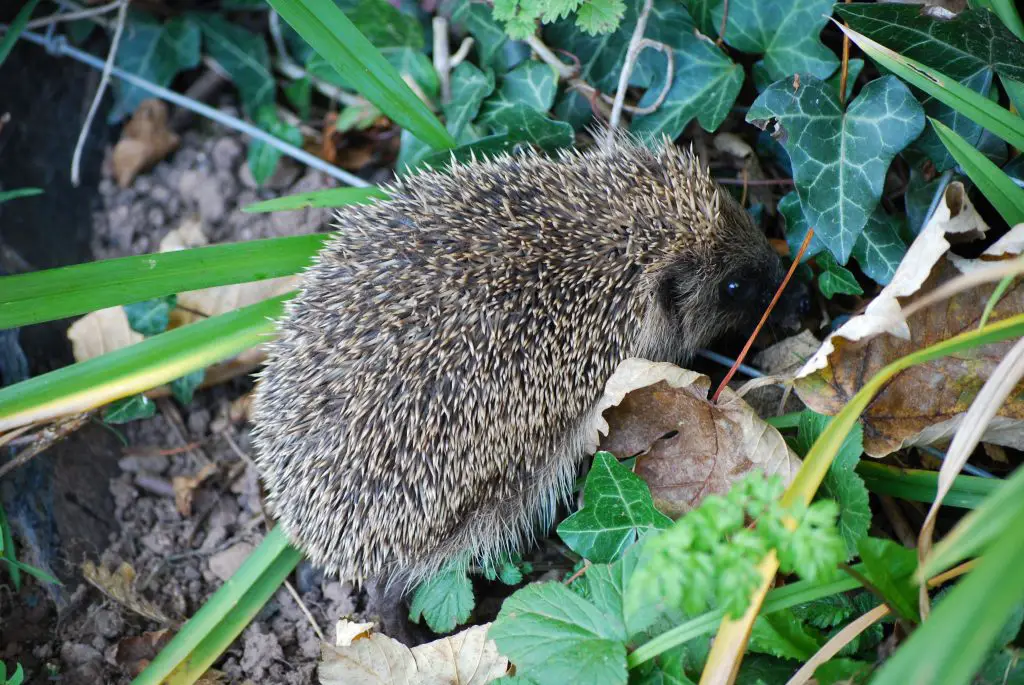
Hedgehogs are super cute and eat slugs. A perfect combination. Also, hedgehog hideouts are easy to build. It can be as simple as a pile of logs. Or you can buy a ready made hedgehog hideout (so cool!).
Hot compost
Slugs and their eggs cannot survive the high temperatures produced during hot composting.
Hot composting is a type of composting that involves a little bit of work but has multiple benefits.
The main ones being:
- Hot composting produces compost faster
- Hot composting kills any pathogens/pests/weed seeds in the compost
The basic concepts of hot composting are:
- Monitor the ratio of nitrogen and carbon in your compost
- Keep a close eye on the moisture levels
- Turn the compost frequently to aerate it
During the peak of hot composting, your pile should be reaching temperatures of up to 160 degrees Fahrenheit. WAY too hot for slugs.
Get a slug proof bin
The type of compost bin you have will make a difference to how many slugs you have.
Dalek-like bins have a lot of dark, moist nooks and crannies for slugs to hide in, while open piles offer a lot less protection.
Raised bins or completely enclosed bins are much harder for slugs to get into. You might find one or two adventurous ones that have slithered through an aeration hole, but generally, enclosed bins are safe from pests.

Compost tumblers like this dual-chambered bin from FCMP don’t touch the ground, so it would be virtually impossible for a slug to find its way in there.
Put grit around your bin
If you don’t fancy changing your bin, you can make it less accessible to slugs by covering the ground around it with a surface that slugs won’t cross.
Slugs instinctively avoid travelling over anything dry, dusty or scratchy.
Things like diatomaceous earth, lime and sawdust are often recommended but will lose effectiveness as soon as they get wet – so aren’t actually that great.
Crushed up egg shells or gravel are better options.
This won’t eliminate slugs completely because they can still come into your compost from underneath, but it will help reduce the population.
Use a trap
You can also put out bait traps around your bin to try and lure the slugs into these before they make it to your compost bin.
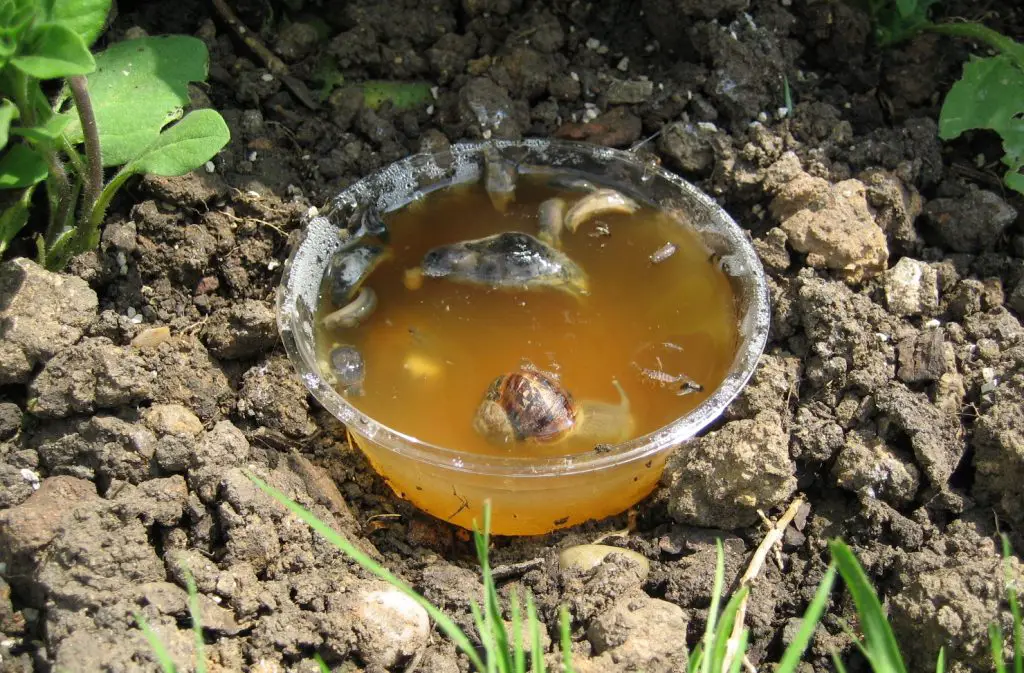
Bury some bowls filled with beer near the compost bin so the lip of the bowl is level with the soil. The slugs will be attracted to the smell of the beer, come to investigate and then fall into the beer and drown.
You can also put out overturned melon rinds near your compost. The slugs will LOVE them. After a few hours of darkness, you should be able to go and collect the melon rind FILLED with slugs. You can then dispose of the slugs however you want, safe in the knowledge they didn’t make it to your compost bin.
Add Nematodes
Nematodes (small worms) are an interesting, but expensive, option. They could be considered a predator of slugs, but they’re also a kind of natural slug pellet.
A certain species of nematode (Phasmarhabditis hermaphrodita) will live as a parasite within a slug and kill it from the inside out. It’s not a pretty death for the slugs and takes a few days, but they are the enemy, right?
Sadly, this nematode species is native to Europe and aren’t found in North America. So, for now, this tip is only for our friends across the pond.
Avoid chemicals
Compost relies on living creatures eating the food and spitting it back out as compost. Slugs included.
If you use chemicals on your compost to kill the slugs, there’s a very high chance these chemicals will also kill the other beneficial creatures in your compost. Any activity will grind to a halt.
For this reason, I never advise using any sort of pesticides in compost.
But I know my warning won’t stop everyone, so if you are going to use chemicals make sure they’re iron phosphate based rather than metaldehyde based which is much more toxic.
How to get rid of slug eggs in compost
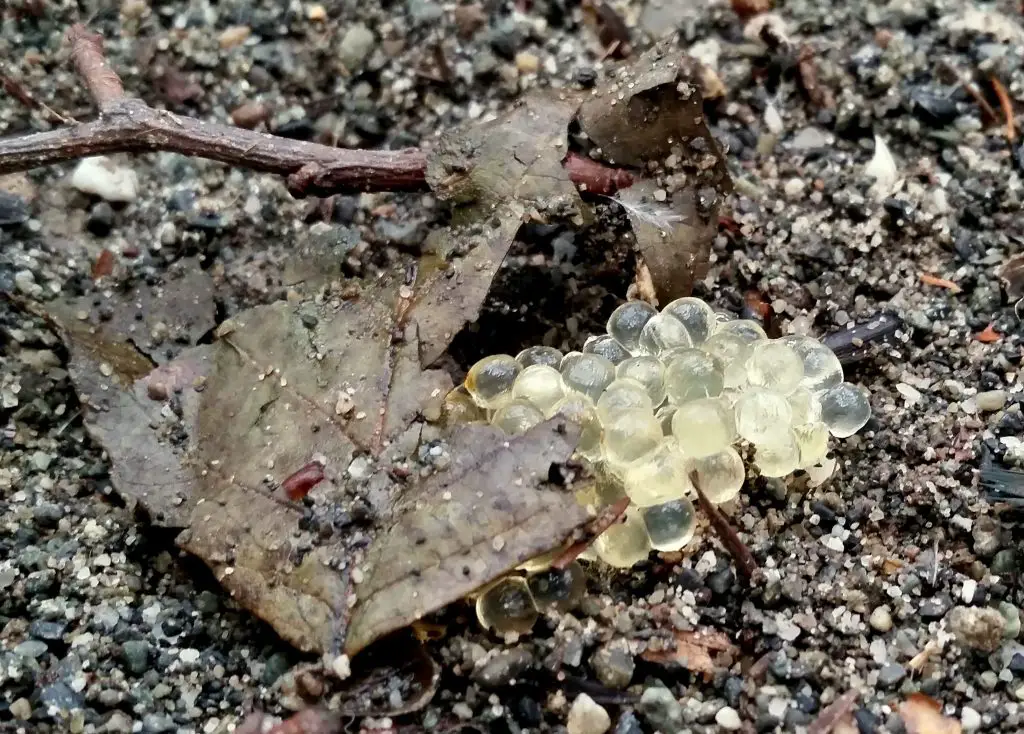
Any slug eggs in your compost should be long gone by the compost is finished. They’ll have either been eaten by beetles or they’ll have been crushed by the weight of the compost above them.
If you want to make doubly sure, spread the compost out in the sun and leave it for a day. The birds will eat any eggs they find.
Note that if you see any small yellow balls, these aren’t slug eggs. They’re more likely to be slow-release fertilizers. Slug eggs are clear or milky and are found in clusters or lines rather than individual balls.
Can I compost dead slugs?
After a night of slug massacaring, it’s not uncommon to end up with a bucket full of dead slugs.
How to get rid of them is a tricky question. Can you put dead slugs in your compost bin?
Slugs can be composted and will break down relatively quickly due to their high moisture content. But, similar to meat, they’ll smell terrible and potentially attract a lot of flies. Try to keep the number of slugs you compost low and bury them in the middle of the pile to minimize smells.
You can also add some brown materials in at the same time to help mask the smell and soak up the extra slime.
If you have a big outdoor bin far away from your house, decomposing slugs wont cause any problems. Do still try to keep the proportion of them to other things in your bin relatively low.
It’s when you have a small compost bin near to your house that dead slugs become problematic. In this case, I would avoid composting more than just 1-2 slugs and find another way to dispose of them.
Another thing to consider is how you killed the slugs. If you threw them in a bucket of salty water, it’s best not to throw the water in the compost. Salt is bad for compost in large quantaties.
How to dispose of dead slugs
Aside from composting them, other ways to get rid of dead slugs include:
- Scattering them around your yard where they will either decompose or be eaten
- Burying them
- Throwing them in your garden waste bin
- Taking them to a local forest and scattering them there
